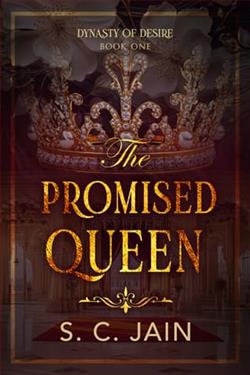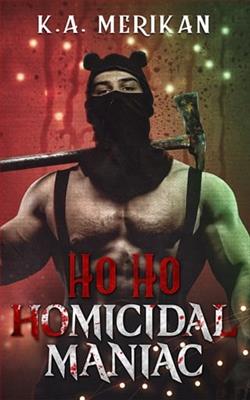Page 313 of Edge of Eternity (The Century 3)
Walli said: "Karolin broke up with me. She's going to marry the pastor."
Tammy said: "I'm so sorry," and Lisa said: "Poor you."
Walli was ashamed of his tears but he could not stop them. He threw the letter down, rolled sideways, and pulled the sheet over his head.
They got into bed either side of him. He opened his eyes. Tammy, facing him, touched the tears on his face with a gentle finger. Behind him, Lisa pressed her warm body against his back.
He managed to say: "I don't want this."
Tammy said: "You shouldn't be alone, feeling so sad. We'll just cuddle you. Close your eyes."
He yielded, and shut his eyes. Slowly his anguish turned to numbness. His mind emptied and he drifted into a doze.
When he woke up, Tammy was kissing his mouth and Lisa was sucking his penis.
He made love to each of them in turn. Tammy was gentle and sweet; Lisa was energetic and passionate. He was grateful to them for consoling him in his grief.
But, for all that, no matter how he tried, he could not come.
CHAPTER FORTY
The mine dog was getting tired.
He was a thin Vietnamese boy wearing nothing but cotton shorts. He had to be about thirteen years old, Jasper Murray guessed. The boy had been so foolish as to go into the jungle to gather nuts this morning just when a platoon of D Company--"Desperadoes"--were setting out on their mission.
His hands were tied behind his back and attached by a string, thirty yards long, to a corporal's web belt. The boy walked along the path ahead of the company. But it had been a long morning, and he was still a kid, and now his steps were faltering, causing the men to catch up with him inadvertently. When that happened, Sergeant Smithy threw a bullet at him, hitting him on the head or back, and the kid would cry out and go faster.
The jungle trails were mined and booby-trapped by the resistance, the Vietcong insurgents, usually called Charlie. The mines were all improvised: reloaded American artillery shells; old U.S. Army Bouncing Betties; d
ud bombs turned into real ones; even French army pressure mines left over from the fifties.
Using a Vietnamese peasant as a mine dog was not very unusual, although no one would admit it back in the States. Sometimes the slants knew which stretches of the trail had been mined. Other times they were somehow able to see warning signs invisible to the grunts. And if the mine dog failed to spot the trap he would get killed instead of them. No downside.
Jasper was disgusted, but he had seen worse things in the six months he had so far spent in Vietnam. In Jasper's opinion, men of all nations were capable of savage cruelty, especially when they were scared. He knew that the British army had committed gruesome atrocities in Kenya: his father had been there, and now, whenever Kenya was mentioned, Dad looked pale and muttered something feeble about brutality on both sides.
However, D Company was special.
It was part of Tiger Force, the Special Forces unit of the 101st Airborne Division. Supreme commander General William Westmoreland proudly called them "my fire brigade." Instead of regular uniforms they wore tiger-striped battle dress without insignia. They were allowed to grow beards and carry handguns openly. Their specialty was pacification.
Jasper had joined D Company a week ago. The assignment was probably a bureaucratic error: he did not particularly belong here, but Tiger Force mixed men from many different units and divisions. This was his first mission with them. In this platoon there were twenty-five men, about half black and half white.
They did not know Jasper was British. Most GIs had never met a Brit, and he had got bored with being an object of curiosity. He had changed his accent, and to them he sounded Canadian, or something. Never again did he want to explain that he did not actually know the Beatles.
Their mission today was to "cleanse" a village.
They were in Quang Ngai Province, in the northern part of South Vietnam known to the army as I Corps Tactical Zone, or just "the northern region." Like about half of South Vietnam, it was ruled not by the regime in Saigon but by the Vietcong guerillas, who organized village government and even collected taxes.
"The Vietnamese people just don't understand the American way," said the man walking alongside Jasper. He was Neville, a tall Texan with an ironic sense of humor. "When the Vietcong took over this region there was a lot of uncultivated land, owned by rich people in Saigon who couldn't be bothered to farm it, so Charlie gave it to the peasants. Then, when we started to win territory back, the Saigon government returned the land to the original owners. Now the peasants are mad at us, can you believe that? They don't get the concept of private property. That tells you how dumb they are."
Corporal John Donellan, a black soldier known as Donny, overheard and said: "You're just a fucking Communist, Neville."
"I am not--I voted for Goldwater," Neville said mildly. "He promised to keep uppity Negroes in their place."
The others within earshot laughed: this kind of banter was enjoyed by soldiers. It helped them deal with their fear.
Jasper, too, liked Neville's subversive sarcasm. But during their first rest stop this morning he had noticed Neville rolling a joint, and sprinkling into the marijuana some of the unrefined heroin they called brown sugar. If Neville was not a junkie, he soon would be.
Guerrilla fighters moved among the people as fish swam in the sea, according to the Chinese Communist leader Chairman Mao. General Westmoreland's strategy for defeating the Vietcong fish was to take away their sea. Three hundred thousand peasants in Quang Ngai were being rounded up and moved to sixty-eight fortified concentration camps, to leave the landscape deserted but for the Vietcong.















